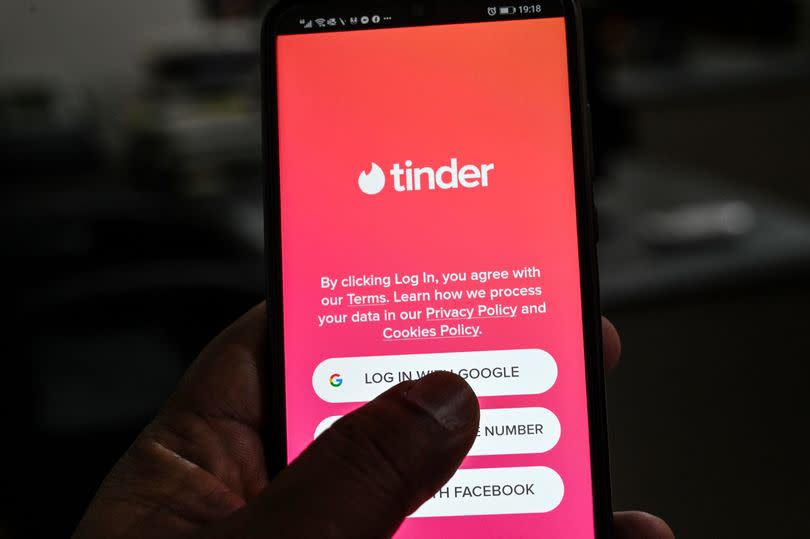'Your gut feeling kept saying something isn't right, there's a dark side to him - I was right'

A man dubbed the 'UK's Tinder Swindler' has been convicted of conning women out of £80,000 using a chilling method that left their lives in tatters.
Peter Gray, 35, portrayed himself as the perfect partner on Tinder, lavishing his dates with unexpected gifts and seemingly kind gestures. However, the women he ensnared sensed something sinister beneath the surface, each feeling that all was not as it seemed.
Gray's deceitful tactics led to him defrauding four women of approximately £80,000, resulting in a 56-month prison sentence handed down in February. Notably, Gray's approach differed from typical romance scams; he never overtly requested money but instead covertly stole their identities to commit fraud, reports the Mirror.
READ MORE: It's been three years but something in Levenshulme is still dividing opinion
One victim, referred to as Jessica to protect her identity, recounted her ordeal to BBC Radio 5 Live. She met Gray, from West Yorkshire, on the dating app in 2018 after ending a long-term relationship and found him to be "a good listener and everything I needed at the time".
It wasn't until a few weeks after she ceased contact with him that Jessica noticed a suspicious transaction of just under £500 from her account, followed by another similar withdrawal the next day. She was horrified to discover loans amounting to £9,000 had been taken out in her name.

During their third date at his flat, Jessica stepped away to use the bathroom, leaving her handbag and purse within reach. It was then that Gray took advantage of her absence.
"I left my bag on his dining table, he went in my bag and took pictures of my driving licence and both my bank cards," she disclosed.
She revealed that a phone call to the loan company led her to discover that Gray used his home address on one of the loans, which helped Jessica identify him as the fraudster. Another victim, who preferred to remain anonymous and is referred to as Elizabeth here, also shared her disturbing encounter with Gray last year.
She was unnerved when he sent flowers to her home without her ever providing him her address.
In an exchange with 5 Live, she recollected the terrifying instance: "He sent me some flowers to my house, I questioned 'how did you know my address? Because I'd never told you where I lived.' He said he went and 'looked at your driving licence and viewed your address because I wanted to do something nice for you,' and it was a bit like, he's being nice but he's gone into my personal things.
"Your gut feeling just kept saying something is not right, there is a dark side to him. It makes you question yourself and your judgment. He was so good at being the person you wanted him to be."

Just days before moving to her new place, Elizabeth's mortgage was withdrawn after he unscrupulously exploited her driver's license details to obtain a £10,000 loan under her name. One more victim, named as Hannah here, who also encountered Gray on Tinder shares a similar account; initially finding him "calming and reassuring," but eventually sensing something "didn't sit right".
Hannah, the former partner, decided to end the relationship. A week later, she received an acceptance letter for a £20,000 loan in her name.
The couple reunited momentarily, with Gray showering her with gifts, but they broke up again. Upon discovering that she was pregnant, her sister dug into Gray's past, contacting one of his ex-girlfriends who cautioned her about Gray's ominous secrets.
"There's no way that I'm going to let a child be brought up anywhere near such a vile human," Hannah said. "My world had just literally broken apart in front of my eyes in that half an hour conversation."
Two out of the women affected were able to resort to the Domestic Violence Disclosure Scheme, commonly referred to as Clare's Law - a system that allows individuals to demand a police record check on their partners, leading to Gray's conviction. Sharing her insights about Gray's tactics, Dr Elisabeth Carter, an associate professor of criminology at Kingston College University, told the radio station: "This is a nontypical romance fraud.
"Usually, you would get somebody grooming an individual and then slowly grooming them into trusting them and asking them for money. This hasn't happened. The grooming has happened, just to get into physical proximity of these women to then take their ID."
Dr Carter pointed out that, while most advice and information from police and banks centres on what to do when someone asks for money, this group had no clue what Gray was up to.
"It's no wonder that these women found themselves in this situation," she said. "Sadly, they blame themselves. What you can do is listen to your body, each of these women said they felt something was wrong. But they couldn't put their finger on it."
She emphasised the significance of discussing with others when a situation seems off, which can provide an opportunity to exchange thoughts and seek another perspective. She also cautioned about love bombing, now recognised as a form of abuse in England.
The Crown Prosecution Service (CPS) recently revised its guidelines on coercive and controlling behaviour to acknowledge the distressing impact of love bombing, a move applauded by charities.
Ruth Davison, Chief Executive of Refuge, told Cosmopolitan that it's "vital that the criminal justice system recognises the extent perpetrators will [go] in an attempt to control and manipulate a partner, and this change is a step in the right direction. I hope this updated guidance means more survivors are able to seek justice for the crime perpetrated against them. It is now the job of our police forces and courts to show perpetrators this is not behaviour that will be tolerated."
Dr Carter, discussing how fraudsters often evade detection for a while, said: "Honing in on that victim's interests, it feels very lovely if someone is listening to you, but that's exactly what these fraudsters do, they take exactly what that individual's issues are or history and they play on it. They also make you feel isolated so that you don't want to tell anyone about it."
In addition to the financial damage caused by con artists, Dr Carter highlighted the enduring psychological harm, as many women revealed the detrimental effect it has had on their trust in others. "In person, they have shared intimate information with each other, it's a particular kind of deception which is incredibly harmful with long-term consequences for trust."
Tinder informed the BBC that it "acts to help prevent and warn users of potential scams or fraud by using AI tools to detect words and phrases and proactively intervene". "We have implemented various ways to warn users of potential scams or fraud, from in-app features to pop-up messages and education," a spokesperson stated.
"All users can request that their match be photo-verified prior to messaging. We also partner with non-governmental organizations and local authorities to promote awareness of online fraud."

 Yahoo News
Yahoo News 
